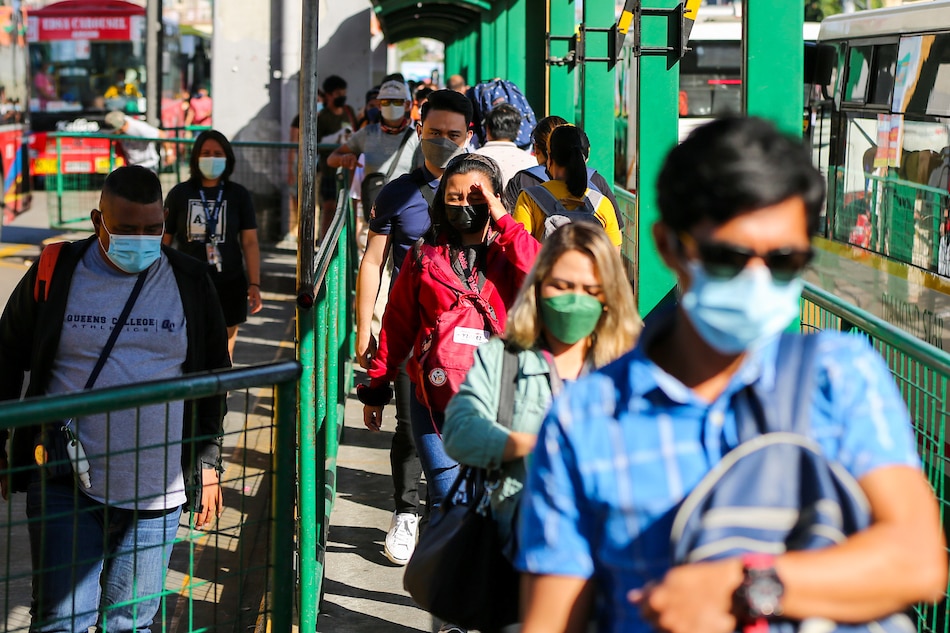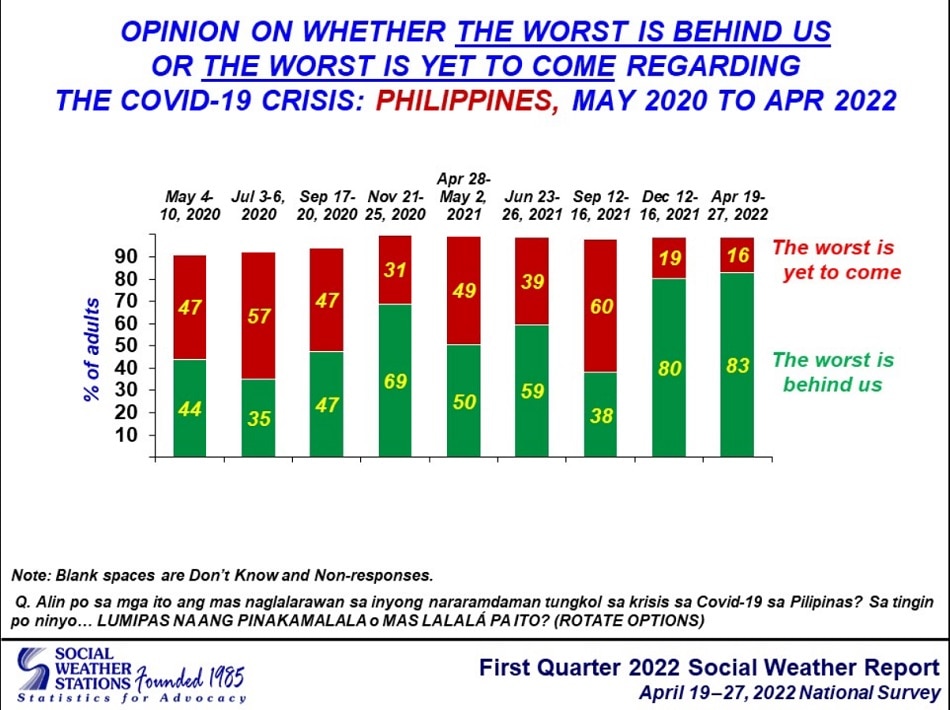83 pct of Filipinos say worst of pandemic 'behind us': SWS | ABS-CBN
ADVERTISEMENT

Welcome, Kapamilya! We use cookies to improve your browsing experience. Continuing to use this site means you agree to our use of cookies. Tell me more!
83 pct of Filipinos say worst of pandemic 'behind us': SWS
83 pct of Filipinos say worst of pandemic 'behind us': SWS
Raffy Cabristante,
ABS-CBN News
Published Jul 20, 2022 09:30 PM PHT
MANILA — A record-high 83 percent of Filipinos believe that the country has hurdled through the worst of the COVID-19 pandemic, a Social Weather Stations (SWS) survey said Wednesday.
MANILA — A record-high 83 percent of Filipinos believe that the country has hurdled through the worst of the COVID-19 pandemic, a Social Weather Stations (SWS) survey said Wednesday.
"This is 3 points above the previous record of 80% in December 2021, and nearly twice as high as the 44% when SWS first asked the question in May 2020," SWS said in a statement.
"This is 3 points above the previous record of 80% in December 2021, and nearly twice as high as the 44% when SWS first asked the question in May 2020," SWS said in a statement.
Filipinos who said they fear the "worst is yet to come" fell to 16 percent in 2022, from 19 percent in December last year.
Filipinos who said they fear the "worst is yet to come" fell to 16 percent in 2022, from 19 percent in December last year.
Most of those who believe that the worst of the pandemic "is behind us" are from Mindanao, with 86 percent of respondents saying they were optimistic of the situation.
Most of those who believe that the worst of the pandemic "is behind us" are from Mindanao, with 86 percent of respondents saying they were optimistic of the situation.
ADVERTISEMENT
This is followed by Metro Manila and Luzon at 82 percent, and the Visayas at 81 percent.
This is followed by Metro Manila and Luzon at 82 percent, and the Visayas at 81 percent.
Majority of respondents who said that the "worst is behind us" either had no formal education or some elementary education (or non-elementary graduates), the pollster said.
Majority of respondents who said that the "worst is behind us" either had no formal education or some elementary education (or non-elementary graduates), the pollster said.
"On the other hand, the percentage of those fearing 'the worst is yet to come' rises with education... It was highest among college graduates," it pointed out.
"On the other hand, the percentage of those fearing 'the worst is yet to come' rises with education... It was highest among college graduates," it pointed out.
But despite the growing optimism among Filipinos, SWS noted that there is still a high number of respondents who said they were worried about catching COVID-19.
But despite the growing optimism among Filipinos, SWS noted that there is still a high number of respondents who said they were worried about catching COVID-19.
According to the polling firm, 88 percent of Filipinos expressed "a great deal" of worry or were "somewhat worried" about getting infected.
According to the polling firm, 88 percent of Filipinos expressed "a great deal" of worry or were "somewhat worried" about getting infected.
Most of the respondents who are worried about catching the coronavirus are from the Visayas and Mindanao, while the lowest number was recorded among residents of Metro Manila.
Most of the respondents who are worried about catching the coronavirus are from the Visayas and Mindanao, while the lowest number was recorded among residents of Metro Manila.
"Compared to past SWS surveys, worry about catching COVID-19 is much greater than worries about catching previous viruses such as Ebola, Swine Flu, Bird Flu, and Severe Acute Respiratory Syndrome (SARS)," SWS said.
"Compared to past SWS surveys, worry about catching COVID-19 is much greater than worries about catching previous viruses such as Ebola, Swine Flu, Bird Flu, and Severe Acute Respiratory Syndrome (SARS)," SWS said.
The survey also found that Filipinos "have always been more worried than Americans about catching COVID-19."
The survey also found that Filipinos "have always been more worried than Americans about catching COVID-19."
The survey was held on April 19-27, during the height of the campaign period for the May 9 elections.
The survey was held on April 19-27, during the height of the campaign period for the May 9 elections.
About 1,440 respondents were interviewed in-person, with 360 respondents each in Metro Manila, Luzon, Visayas, and Mindanao.
About 1,440 respondents were interviewed in-person, with 360 respondents each in Metro Manila, Luzon, Visayas, and Mindanao.
The Philippines logged its first confirmed COVID-19 case on Jan. 30, 2020 in a Chinese woman who arrived from Wuhan City, China where the disease is believed to have first emerged.
The Philippines logged its first confirmed COVID-19 case on Jan. 30, 2020 in a Chinese woman who arrived from Wuhan City, China where the disease is believed to have first emerged.
As of Wednesday, the country's total infections stood at 3,739,160, of which, 20,678 are active while 60,641 have resulted in deaths, data from the Department of Health showed.
As of Wednesday, the country's total infections stood at 3,739,160, of which, 20,678 are active while 60,641 have resulted in deaths, data from the Department of Health showed.
Since the rollout of the vaccination program on March 1 last year, nearly 70.7 million people in the country have already been fully vaccinated against the respiratory disease, with more than 15 million receiving their booster shot.
Since the rollout of the vaccination program on March 1 last year, nearly 70.7 million people in the country have already been fully vaccinated against the respiratory disease, with more than 15 million receiving their booster shot.
RELATED VIDEO:
RELATED VIDEO:
ADVERTISEMENT
ADVERTISEMENT




